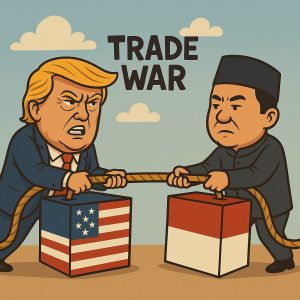Indonesia Amid the Storm of a Trade War

By : DR. Abdul Wadud Nafis, Lc., MEI.
In the vortex of an increasingly integrated global economy, even a single spark of tension between two global giants—such as the United States and China—can shake the economic foundations of developing countries, including Indonesia. The ongoing trade war is not merely a conflict over tariffs and trade barriers, but a battle of influence and economic dominance with systemic implications.
Indonesia, with its open economy reliant on commodity exports and foreign investment, is by no means immune to the domino effect of this global trade conflict. On one hand, the trade war presents threats such as export slowdowns, exchange rate volatility, and investment uncertainty. On the other hand, it contains strategic opportunities to capture new markets, attract industrial relocation, and strengthen national competitiveness.
This article attempts to comprehensively analyze how the international trade war impacts various aspects of Indonesia’s economy, while also reflecting on strategies that can be adopted to not only survive but thrive amid global turbulence.
The influence of the international trade war on Indonesia’s economy is complex and significant, both in the short and long term. The following are several key impacts:
1. Slower Export Growth
The trade war, especially between major economies like the US and China, can lead to a decline in global demand. These countries are key trading partners for Indonesia. As a result:
Indonesia’s exports, especially commodities such as coal, palm oil, and rubber, decrease.
Global commodity prices may drop, reducing Indonesia’s export earnings.
2. Disruption of Global Supply Chains
The trade war disrupts global supply chains, particularly in manufacturing industries. Its impact on Indonesia includes:
Domestic industries such as electronics and automotive face difficulties in obtaining imported raw materials at competitive prices.
Production costs increase.
3. Rising Investment Uncertainty
Global investors tend to hold back amid trade tensions, which can result in:
A slowdown in foreign direct investment (FDI) into Indonesia.
Rupiah depreciation due to capital outflows to safer countries.
4. Market Substitution Opportunities
However, the trade war also creates opportunities:
Indonesia can become an alternative product source for countries affected by high tariffs.
Potential increase in investment from companies seeking to relocate their production base from China to ASEAN countries, including Indonesia.
5. Impact on Consumers
With rising import prices and rupiah fluctuations:
Consumer goods prices increase.
People’s purchasing power declines, especially for electronics and imported household items.
Conclusion:
The international trade war generally has a negative impact on Indonesia’s economy through channels such as exports, investment, and exchange rates. However, with adaptive policies and support for industrial downstreaming, Indonesia can also seize opportunities from these global market shifts.
The international trade war is not merely a conflict between nations, but a test of a nation’s economic resilience and intelligence. For Indonesia, this challenge must be met not with fear, but with strategy, innovation, and the courage to seize opportunities. In every global crisis, there is always a window for growth—as long as this nation is ready to read the wind and adjust its sails.
References:
1. Krugman, P. R., & Obstfeld, M. (2018). International Economics: Theory and Policy (10th ed.). Pearson Education.
2. Mankiw, N. G. (2020). Principles of Economics (9th ed.). Cengage Learning.
3. Bank Indonesia. (2020). Laporan Perekonomian Indonesia 2020. Jakarta: Bank Indonesia. Retrieved from: https://www.bi.go.id/
4. Ministry of Trade of the Republic of Indonesia. (2021). Indonesia’s International Trade Developments. Jakarta: Ministry of Trade. Retrieved from: https://www.kemendag.go.id/
5. Basri, M. C. (2019). The Impact of the Trade War on the Indonesian Economy. Journal of Indonesian Economics and Development, 20(2), 87–99.
6. World Bank. (2020). Global Economic Prospects. Washington, DC: World Bank. Retrieved from: https://www.worldbank.org/
7. Coordinating Ministry for Economic Affairs of the Republic of Indonesia. (2022). Strategies to Face Global Uncertainty. Retrieved from: https://ekon.go.id/


